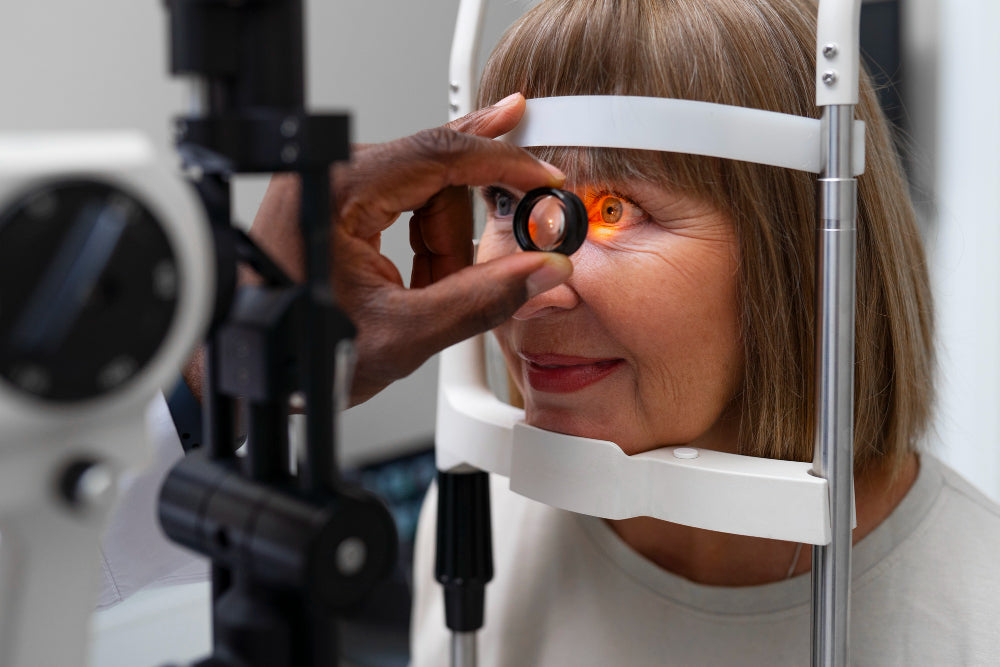If you're considering a dynamic career in eye care, one of the most common questions you might ask is, "How much do eye doctors make?" The answer varies depending on the type of eye doctor, their experience, geographic location, and work setting.
Eye doctors play a crucial role in taking care of or maintaining vision health, diagnosing eye conditions, and providing treatments that can dramatically improve the quality of our lives.
In this post, we'll break down the average eye doctor's salary in the United States, highlight the factors that influence it, and provide insight into its average income.
Eye Doctor Salary Overview
An eye doctor's or optometrist's salary can fluctuate based on several key elements, including location, experience, and the type of practice.
According to the U.S. Bureau of Labor Statistics (BLS), optometrists' average annual salary was approximately $134,830 in May 2024. This figure provides a solid benchmark for understanding what eye doctors can earn.
Types of Eye Doctors

Before diving into numbers, it's essential to understand the different types of eye doctors:
-
Optometrists (ODs) – ODs/Doctors of optometry are primary care providers for eye health. They conduct medical and routine eye exams, prescribe corrective lenses, diagnose eye conditions, and provide non-surgical treatments.
-
Ophthalmologists (MDs/DOs) – Ophthalmologists are medical doctors (MDs) or doctors of osteopathy (DOs) who can diagnose and treat all eye conditions, perform surgeries, and prescribe medications. Their education and training are more extensive, which generally translates into higher salaries.
-
Opticians – While not technically doctors, opticians play a vital role in helping patients select and fit glasses and contact lenses. Their salaries differ significantly from those of ODs and MDs.
Average Eye Doctor Salary in the U.S.
So how much do eye doctors make? According to the U.S. Bureau of Labor Statistics (BLS) and other recent healthcare salary data:
-
As of 2025, optometrists earn a median salary of approximately $140,324 per year.
-
Ophthalmologists earn much higher incomes, often between $250,000 and $400,000 annually, with some specialists earning more.
-
Opticians earn between $37,000 and $60,000 annually, depending on experience and location.
Eye Doctor Average Salary by State
While the national average provides a general idea, looking at specific states for a more localized understanding of eye doctor salaries is essential. For example:
-
California: Approximately $135,000
-
Texas: Approximately $118,000
-
Florida: Approximately $109,000
-
New York: Approximately $140,000
These figures can fluctuate based on local demand and cost of living, highlighting the importance of geographic considerations in determining eye doctor pay.
Factors Directly Influencing Eye Doctor Pay

Several factors can impact how much eye doctors make:
1. Geographic Location: Salaries vary widely depending on where an optometrist practices. For instance, eye doctors in urban areas or regions with a high cost of living often earn more than those in rural locations. States like California and New York typically benefit from higher salaries due to high demand and living costs.
2. Practice Type: Optometrists can work in various settings, including private practices, hospitals, and retail chains. Those who own their practices may have higher earning potential but face the responsibilities and costs of running a business.
3. Experience Level: As with many occupations, experience significantly affects salary. New graduates may start on the lower pay scale, while seasoned optometrists with years of experience can command considerably higher wages.
4. Specializations: Some optometrists specialize in pediatric optometry, geriatric optometry, or ocular disease. Specialization can increase earning potential as these professionals often provide services requiring additional training and expertise.
5. Subspecialties in Ophthalmology: Ophthalmologists who pursue subspecialties like retina, cornea, or oculoplastic typically earn more. These roles require additional training but are in high demand due to the precision and complexities involved in treatment.
6. Work Setting: The specific environment where an eye doctor works — urban or rural can affect salary. Urban clinics often handle more patients and may offer higher compensation, while rural settings might provide other incentives such as loan forgiveness or housing benefits.
7. Work Hours: Some optometrists or ophthalmologists work part-time or have flexible hours, which can impact annual income. Full-time practitioners who see more patients tend to earn more.
How Eye Doctor Salaries Compare to Other Medical Professions
Ophthalmologists earn slightly less than some other medical specialists, such as oral and maxillofacial surgeons who made a median salary of $239,200 in 2023 and gynecologists that’s about $314,700 a year, but are on par with psychiatrists, radiologists, and urologists.
Is Becoming an Eye Doctor Worth It?
While the education and licensing process can be time-consuming and expensive, the return on investment is often high. Many optometrists commonly report high job satisfaction due to meaningful patient interactions, autonomy, and steady demand.
Though they spend more years in school and residency, ophthalmologists also enjoy significant financial and professional rewards. Their ability to save or improve vision through surgeries makes this path auspicious.
If you're considering a career in eye care, these potential salaries and growth opportunities can make it a lucrative and fulfilling choice.
Eye Doctor Income Growth Outlook
The U.S. Bureau of Labor Statistics states that employment for optometrists will grow by 9% from 2020 to 2030, which is even faster than the average for almost all occupations. This is due to aging populations, increased access to vision insurance, and the rising need for eye care services in this digital era.
Similarly, demand for ophthalmologists is expected to rise, especially in underserved areas. Technological advancements in eye surgeries, laser treatments, and diagnostics also make this an evolving and promising field.
Eye Doctor Income Trends and Increased Income Opportunities
In addition to base salaries, many optometrists, particularly those in private practice, benefit from bonuses and profit-sharing. Some eye doctors also offer additional services, such as vision therapy or specialized treatments, which can further increase their income.
Some eye doctors increase their income through additional services or roles, such as:
-
Offering specialty lenses or vision therapy.
-
Partnering with cosmetic services (e.g., Botox, fillers).
-
Teaching at optometry schools or speaking at conferences.
-
Consulting for eyewear brands or startups.
According to recent surveys, eye doctor salaries have been on the rise overall. As awareness of eye health increases and the population ages, demand for eye care services is expected to grow, potentially leading to higher salaries in the coming years.
How to Become an Eye Doctor
For Optometrists:
-
Earn a bachelor's degree (preferably in a science-related field).
-
Complete a Doctor of Optometry (OD) program (4 years).
-
Pass national and state licensing exams.
For Ophthalmologists:
-
Earn a bachelor's degree.
-
Complete medical school (MD or DO degree).
-
Finish a 1-year internship and 3+ years of ophthalmology residency.
-
Obtain board certification.
The journey is rigorous but highly respected and financially rewarding.
Frequently Asked Questions (FAQs)

Do eye doctors receive bonuses?
Yes, especially ophthalmologists, who can receive bonuses up to $62,188 and profit-sharing averaging $10,000 annually.
Does experience make a big difference?
Absolutely. Ophthalmologists with 10-20 years of experience can earn up to $252,000 per year, compared to $183,000 for those just starting out.
Which states pay eye doctors the most?
For ophthalmologists: New Hampshire, North Dakota, and Maine lead the nation.
For optometrists: Alabama, Alaska, and Arizona report higher-than-average salaries.
Do eye doctors make more in private or corporate settings?
Private practice owners can earn significantly more than corporate-employed doctors, but also take on more risk and responsibility.
Can optometrists perform surgery?
No, optometrists do not perform surgical procedures. Ophthalmologists, however, are licensed to perform eye surgeries.
How long does it take to become an eye doctor?
Optometrists: Around 8 years (4 years undergraduate + 4 years OD school)
Ophthalmologists: Around 12-14 years (undergrad, med school, internship, and residency)
Is eye care a growing industry?
Yes! Aging populations and increasing screen time are boosting the demand for eye care professionals.
Why Eye Doctor Salaries Vary
Salary differences reflect the complexity of care provided, the level of training required, and regional economic factors. Ophthalmologists, medical doctors who perform surgeries, naturally command higher salaries due to their extended education and the nature of their work.
While highly trained, optometrists focus more on routine care and vision correction, which is reflected in their compensation.
Conclusion
So, how much do eye doctors make? Eye doctors in the U.S. earn varying salaries based on their role; optometrists average $140K, while ophthalmologists make $250K–$400K annually.
Pay depends on factors like location, experience, specialization, and work setting. States like New York and California offer higher wages, and private practice can boost income through bonuses or services.
Overall, eye care careers offer strong income potential and rising demand due to aging populations and digital eye strain.
With a lucrative salary and many factors influencing earning potential, optometry can be a personally and financially rewarding profession. As demand for eye care continues to grow, opportunities for increased income will also likely expand.
Choose Vision Source Rio for Expert Eye Care

Whether you're a patient looking for trusted professionals or a practitioner exploring career options, Vision Source Rio and Vision Source Heights stand at the forefront of eye care excellence.
Our compassionate, skilled doctors combine cutting-edge technology with personalized care to save, protect, and improve your vision.
Don't wait until vision problems impact your daily life. Book your appointment today and experience why so many families in the community trust us with their eye health.
See better, live better-with us.





